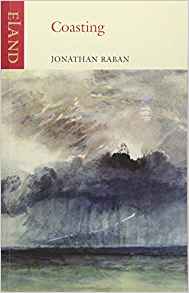Coasting
Jonathan Raban

An absorbing travelogue shot through with vivid descriptive writing bordering on poetry.
The Roman poet Virgil, one of the earliest foreign observers, wrote that ‘Britons are wholly sundered from all the world’.
The water bunches and crumples as it hits the wind head-on. The breakers all around you are as angular and grey as boulders of granite. Where the sea collides with the submerged whalebacks of the Goodwin Sands, it explodes in forty-foot plumes of powdered white. Racing shallowly over the sands it raises quills of spray as if a herd of aquatic porcupines was on the run. The boat rolls and plunges; the sky tips on its end. Heart in mouth, shaken about like a dice in a cup, you hang on to the wheel for dear life
yachting slums like the Solent
the identity of the Falklanders, like that of the British, was bound up in endless aggressive assertions of their differences from the continental giant across the water.
Its silence was the silence not of seclusion but of retirement – of childlessness, of pottering about indoors, of watching golf on the TV in the afternoons and having all the time in the world to read the Radio Times.
The land in general turns into a wonderfully protean material: cliffs slide in and out from behind each other; new hills slowly enfold themselves round cities; houses and trees wander about the landscape, meeting and separating, while you stay fixed on your own lumpy patch of water.
Vertical take-off fighters dithered grotesquely aloft, making the air below them boil
You didn’t believe in it, but you couldn’t bring yourself to chuck it out, and sometimes it gave you the creeps in the night.
For the sea off Portland Bill is a famously dreadful spot.
Their loving thrift was justified only by the assumption that they’d live for ever, saving, investing, turning their collars and reknitting their old jerseys, as perpetually self-renewing as winter trees.
English towns do not, under normal circumstances, float on pure light and ripple brightly in the sky. Rye did, and I steered for it cautiously, not wishing to run aground inside an optical illusion.
The character of the North Sea was bad but interesting.
This was how wounds healed in a civilisation. Almost as soon as they were inflicted they became part of History – the deadly pleasure indulged in by old men blathering on with stories that make young men yawn.
His word-perfect, world-imperfect, poems were as rare to show as famous comets. He wrote of being alone, of private dereliction, of living without love – inconsolable poems, teased and haunted by the beauty, only just out of reach, beyond the window of the railway carriage or the solitary room. The separating glass of windows figures again and again in his work. Yet he showed how such a life (a life from which most people would shrink in panic) could be managed with, if not quite gaiety, at least great dignity and grace. His poems are heartbreakingly exact. If poems can teach one anything, Larkin’s teach that there is no desolation so bleak that it cannot be made habitable by style. If we live inside a bad joke, it is up to us to learn, at best and worst, to tell it well.